The bully pulpit: Documentary explores VQR tragedy
-
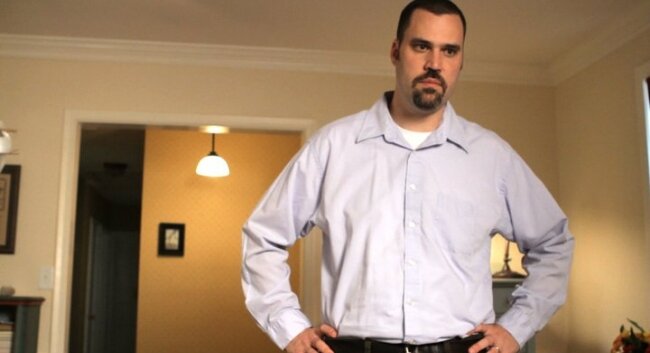 VQR editor Ted Genoways. "Kevin's mood could be dark for days, weeks at a time," he says.Documentary still
VQR editor Ted Genoways. "Kevin's mood could be dark for days, weeks at a time," he says.Documentary still -
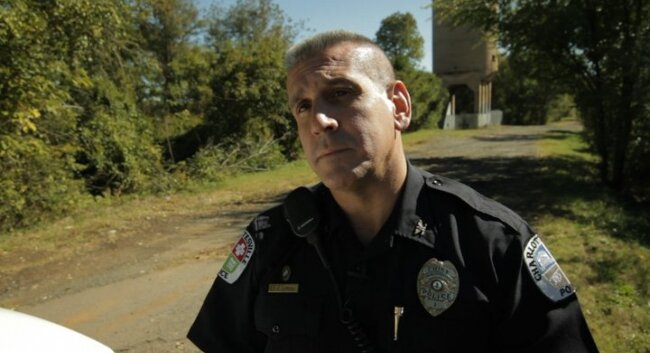 Charlottesville Police Chief Tim Long in front of the Coal Tower.Documentary still
Charlottesville Police Chief Tim Long in front of the Coal Tower.Documentary still -
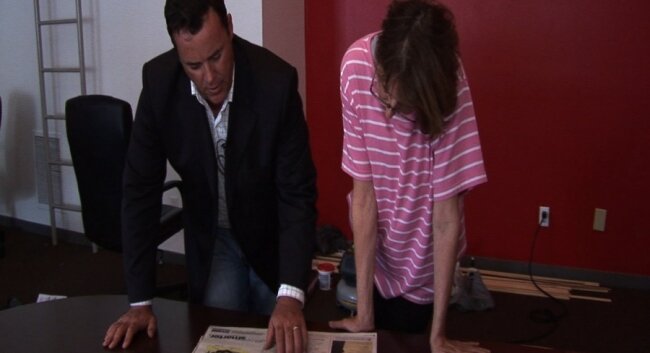 Hook reporter Dave McNair and Peterson read letters of support for Genoways that were published in the paper.Documentary still
Hook reporter Dave McNair and Peterson read letters of support for Genoways that were published in the paper.Documentary still -
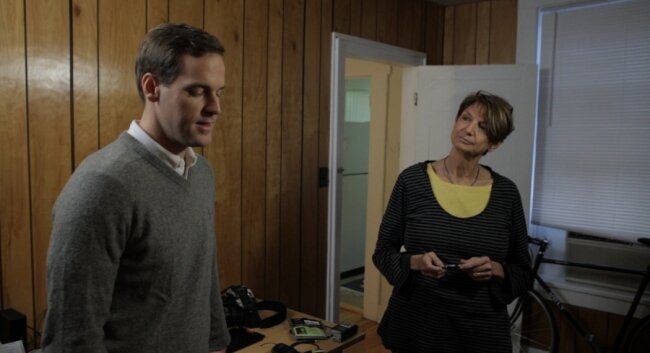 Peterson with VQR contributor Elliott Woods, the awarding winning VQR Photo Journalist who also interned in the VQR office while still a UVA student.Documentary still
Peterson with VQR contributor Elliott Woods, the awarding winning VQR Photo Journalist who also interned in the VQR office while still a UVA student.Documentary still -
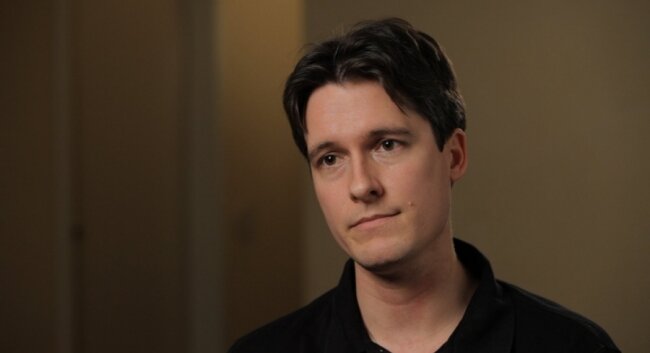 Waldo Jaquith, Morrissey's friend and co-workerDocumentary still
Waldo Jaquith, Morrissey's friend and co-workerDocumentary still -
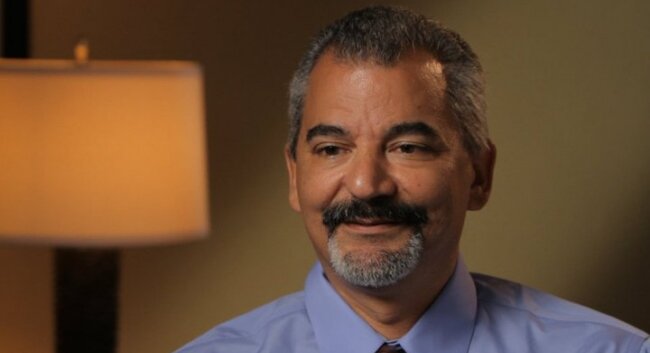 Brad Holland, University of Virginia OmbudsmanDocumentary still
Brad Holland, University of Virginia OmbudsmanDocumentary still
Last summer, the tragic suicide of Virginia Quarterly Review managing editor Kevin Morrissey, who made a 911 call reporting his own shooting down by the Coal Tower on former UVA president John Casteen's last official day in office, made national headlines, including a segment on the Today show, which revealed a troubled office environment at the award-winning magazine and launched a discussion of so-called "workplace bullying."
That caught the attention of New York City-based documentary filmmaker Beverly Peterson, a former bullying victim herself, who has devoted herself to telling these kinds of stories. Almost as soon as the VQR story broke, she called the VQR offices.
"Our arrival was delayed a few weeks when the Today show segment came out and no one wanted to talk on camera anymore," says Peterson. "I was pretty surprised at the way the story was framed in that segment, so of course it only intrigued me more as events continued to unfold in both the press and the comment boards."
Eventually, Peterson managed to get just about everyone connected with the story on camera, including VQR editor Ted Genoways, whom former VQR employee Waldo Jaquith had accused on the Today segment of treating Morrissey "egregiously" in the last few weeks of his life. Indeed, Genoways appears in Part I of the documentary, along with his wife Mary Anne, who tearfully says, "We did so much for Kevin, but it was never enough."
"Kevin's mood could be dark for days, weeks at a time," says Genoways in the film, "in ways that were not always visible to the rest of the staff."
Peterson also interviews Charlottesville Police Chief Tim Longo, Morrissey's sister, Maria, Waldo Jaquith, VQR contributors, bullying experts, UVA officials, and this writer, to name just a few.
The result is a 40-minute documentary called Our Bully Pulpit: What Really Killed Kevin Morrissey?
"The key to making a documentary is access," says Peterson. "No access, no documentary. So it's really important to me to struggle and obsess about my true intentions for what I want a film to accomplish from the start– not a 'pitch' description, but the true core of what this film can hope to bring to the public dialogue."
Peterson says her goal is to use her film to re-frame what the public dialogue about workplace bullying should be.
"It's not some simple good guy versus bad guy story," she says. "The real answers are in the nuances and shadowy areas. What Really Killed Kevin Morrissey? is screening on the Internet, and I hope it spurs in viewers a similar passion and desire to grapple with answers just as I've had to."
To see Part I of the documentary, click here.
15 comments
Almost 24 hours and no comments????? What gives?
Nice article Dave. What ever happened? All I heard was there was some phony bureaucratic report by the president's office. I really think you should do another piece and dig deeper. I think VQR is just one example of the way the University is run. There are others I am sure. Where there is smoke there is fire, in this case where there was fire there is probably a raging range fire. I hope the documentary covers the whole organizational culture of UVA and other large institutions.
The more I think about the role of Ted Genoways in this, the more I blame UVA administration. And I'm certain his wife _must_ believe her illusion that Kevin didn't try to get help. She can continue her magical thinking and connect "help" to psychological or psychiatric care, but the truth is something different: if she were to acknowledge the number of times Kevin and the rest of the entire VQR staff actively solicited help from President Casteen and company, then she would would also be forced to confront the truth about her husband. I don't need convincing. I personally know several people outside of VQR who were victimized by Genoways when he didn't like something they said or did. And anyone who's enabled him to continue to act the way he does holds responsibility for the ongoing effect he has on others and the damage he's already done.
Citizen Party,
Well, there was this story I wrote back in April...
http://readthehook.com/89489/submission-guidelines-will-fallen-vqr-r...
Dave,
I had missed that follow-up story. Thanks for the alert. Just read it and once again, I can't tell you how great your work is. These articles are award-winning investigative journalism. No one else in town tells these stories. My only suggestion is to keep going. The following parts of the article, I would argue, need more follow-up:
"Ms. Morrissey, who said just weeks after her brother's death that she hoped some good could come out of the tragedy and vowed to push for policy changes concerning workplace bullying at UVA, has since become an advocate for the cause. Recently, she was invited to speak to state legislators in Albany, New York, as they consider a new Healthy Workplace Bill, designed in part to prevent "psychological violence.
"I'm willing to do anything that I can to save others from Kevin's fate and spare another family the pain of losing a loved one to workplace bullying-related suicide," says Ms. Morrissey. "If even one life is saved, it will be worth it."
...
"Later, it was revealed that Morrissey had reached out to UVA officials as many as 18 times to address the workplace in the weeks before his fateful decision. One VQR staffer called Genoways' treatment of Morrissey "egregious," while others accused him of squandering VQR funds, being an absentee boss, and courting a wealthy, 24-year-old donor by creating a job for her without an official search.
What's more, a 32-year veteran employee of VQR, Candace Pugh, came forward to claim she was harassed and "forced out" by Genoways five years earlier.
"I can understand why Kevin did what he did," said Pugh, who won a year-long severance package. "That man should not be in charge of other people. He’s a danger."...
"Morrissey shot himself downtown by the railroad Coal Tower on UVA President John Casteen's last official day in office, and incoming President Teresa Sullivan announced that VQR staffers would be put on paid leave and that the winter issue of the magazine would be canceled, ending the magazine's remarkable publishing streak. And she ordered an investigation into VQR operations.
The resulting report could bring to mind the phrase "damning with faint praise." While Genoways was called a "creative, innovative manager" and officially cleared of any charges of workplace bullying, his management skills were deemed "questionable" and in need of "corrective action."
Notably missing was any mention of the "unacceptable workplace behavior" that Genoways had accused Morrissey of committing before Genoways banned Morrissey from the office just a week before his death. Similarly, there was no mention of the hiring of the wealthy young donor, whose position was filled by Genoways outside the state's usual guidelines for advertisement and then quietly eliminated during the investigation."
...
"In the end, President Sullivan called for the creation of a task force to "strengthen" the University's "policies and structure with regard to acceptable workplace conduct."
...
"Not only did former President Casteen advocate for Genoways' tenure, he also appears to have looked the other way despite outbursts with department chairs, unexplained employee office bans, the draw-down of the rainy-day fund, and a questionable hire. (Casteen, who is currently out of the country, was not available for comment.)"
So what's happened to the policy changes? What has this task force done of any substance? How has UVA changed as a result of this? The story needs to be connected to ongoing daily practice that many people still suffer under.
I think a follow-up article expanding the topic to workplace bullying in general and at UVA specifically beyond what happened to Kevin would really tie the room together. You could go around and ask other workers at UVA what the culture is like for them. Ask low level hospital workers, focus on the fact that there has not been a successful employees union, things like that. There is no freedom of speech for workers who live in fear.
Dave, you are on to something. Keep up the great work!!!!!!! As I said in another venue, you deserve a huge raise and I wish you were making editorial decisions. Thank you. CP
@XXX - You're kidding, right? You are making a mental health assessment of Ted Genoways' wife over the internet? Seriously?
You seem unable to separate the idea of "getting help at work" with "getting help with a mental illness." People don't commit suicide over problems at work, they commit suicide because they are mentally ill. Maybe Genoways' wife knew Morrissey a bit better than you did.
Armchair quarterbacking is one thing, internet psychology another.
@ XXX says "People don't commit suicide over problems at work, they commit suicide because they are mentally ill." Really!! And what do you base this sweeping statement on? I would say there will be many people who would disagree, including myself, in saying that people don't commit suicide because of problems at work. I think that's pretty simplistic and ignorant actually. I would suggest that many people who have been in a bullying culture at work and/or been directly bullied themselves might have Post-Traumatic Stress Disorder, which could be classified as a mental illness. But it's still been caused by the issues in the workplace!
Oh yeah, another 'mental illness' is Sociopathic Personality Disorder. These are people without genuine feelings of compassion and without a conscience. Bullies and apologists for bullies might have it.
As to @XXX: people live in environments that influence their state of mind. Ever heard of seasonal affective disorder? We have an effect on each other. Mental illness itself is partially biological and partly sociological-they interact. Rather than deal with the awful way we treat each other for personal and bureaucratic gain, we as a society just blame the victim and medicate people when if we just made workplaces more human and loving places, we would not need to medicate people because they would be happier and wouldn't need the pharmacy. Problems a work can influence people to commit suicide if they are extreme enough and I think we see this happening in the story.
The lack of workplace democracy, management abuse, and the lack of voice for labor has real consequences for people just like our election of George Bush had real consequences-a lot of dead people in Iraq.
Really Citizen Party? Take a tragedy and a real issue that is often overlooked and use it to take a jab at George Bush? Can I use your logic and say that our election of Obama led to a lot of dead in Afghanistan? BTW, you do realize that he had the support of Congress.
Just to correct my earlier comment - i was referring to the Comment by iTryToThink, not @XXX. Sorry, i got distracted by iTryToThinks reference to @XXX at the beginning of his/her post.
Shaggy,
Sure use the logic to include Obama and Congress for that matter, though it seems like Obama inherited that one. But my point was really about how the decisions by people at the top of any organization have real consequences for people working in those organizations. The policies and culture set by leaders create an environment within which tragic things like this happen. In a culture where capitalism has run amuck, we have work environments that are very top-down and treat people like disposable units rather than as human beings. The article paints a picture of leaders at the top of UVA turning a blind eye to what their managers were doing, or perhaps even supporting the behavior. We have bullying because its an acceptable management technique in organizations both private and public, its in the culture so to speak.
Why must there always be a scapegoat? Why is it that everything has to be deflected?
The workplace is just that, a workplace. It is not a daycare center or a self help group.
We are not guaranteed a job for life. We are not guaranteed not to have our feelings hurt or our pride taken down a few notches from time to time. Believe it or not we can all be replaced within hours of being fired or quitting with minimal disruption to business. None us are special and none of us should be expected to be treated with kid gloves because we are sensitive.
So what is next? Let us pin all suicides on the families or friends for various reasons?
It is what it is and anything more diminishes the real pain and anguish and the need for professional help for people suffering with various mental illnesses.
jeezlouise,
Let's hope that the obviously mentally ill bully gets the help he needs.
And let's continue to let workplaces celebrate and retain the tyrants who terrorize their entire staff of employees into complaining/suiciding/quitting.
I would be inclined to believe Morrissey was merely sensitive and perhaps undeserving of "special treatment" if his complaints were his alone, but there is a frightening pattern at VQR.
oh @Itrytothink -- perhaps your moniker should be read Itrytoread. Try re-reading what I wrote before putting words into my Internet mouth.
Beverly Peterson is tastelessly exploiting the situation. She makes me sick.
"Let's hope that the obviously....."
I tend to believe mentally ill is a little strong. I would also like to point out that a boss not liked by a group of people is open to more hostility and complaints than one who is considered their best buddy. It turns into a us vs him atmosphere.
I am not siding with Mr. G. or UVA. I am merely pointing out that there could be more to this story than is being told by all sides. What happens between a boss and an individual employee is usually not common knowledge to others. With confidentiality laws in effect I really doubt we will ever know the true story.